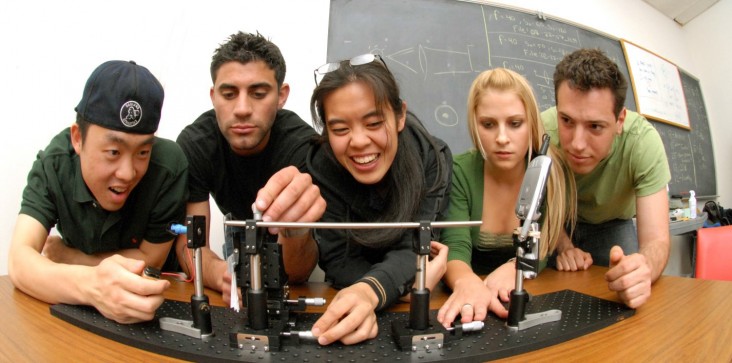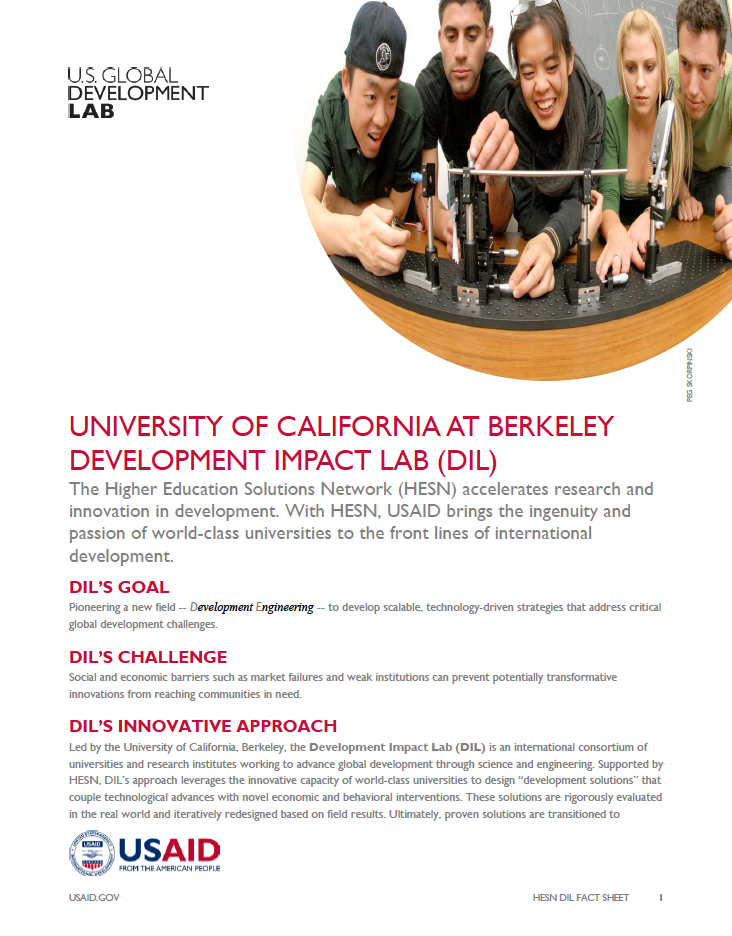- What We Do
- Agriculture and Food Security
- Democracy, Human Rights and Governance
- Economic Growth and Trade
- Education
- Environment and Global Climate Change
- Gender Equality and Women's Empowerment
- Global Health
- Humanitarian Assistance
- Transformation at USAID
- Water and Sanitation
- Working in Crises and Conflict
- U.S. Global Development Lab
Speeches Shim

DIL's Goal
Pioneering a new field -- Development Engineering -- to develop scalable, technology-driven strategies that address critical global development challenges.
DIL's Challenge
Social and economic barriers such as market failures and weak institutions can prevent potentially transformative innovations from reaching communities in need.
DIL's Innovative Approach
Led by the University of California, Berkeley, the Development Impact Lab (DIL) is an international consortium of universities and research institutes working to advance global development through science and engineering. Supported by HESN, DIL’s approach leverages the innovative capacity of world-class universities to design “development solutions” that couple technological advances with novel economic and behavioral interventions. These solutions are rigorously evaluated in the real world and iteratively redesigned based on field results. Ultimately, proven solutions are transitioned to partners for scale-up and dissemination. DIL’s interdisciplinary network of more than 100 researchers is designing and rigorously testing solutions that provide access to a range of essential services -- from water quality and child literacy to electricity and disease diagnosis. The lab has implemented or funded 135 projects as of 2016, reaching hundreds of thousands of people in more than 35 countries around the world.
Berkeley Development Impact Lab Fact Sheet ![]() (pdf - 245k)
(pdf - 245k)
Formalizing the Dev Eng Approach
DIL has established a new field of development engineering (Dev Eng) which is helping to train new generations of development innovators to more efficiently and effectively solve challenges associated with poverty:
- The Development Engineering PhD “minor” prepares doctoral students to develop, pilot, and evaluate tech interventions for improving human and economic development within complex, low-resource settings.
- The Journal of Development Engineering in an open access, interdisciplinary journal showcases research on innovative technologies that are improving welfare in developing countries, as well as novel measurement tools are improving the quality and relevance of empirical data.
Generating Impact at Scale
To demonstrate the Development Engineering approach, DIL invests in projects along the entire arch of technology design, from idea and initial deployment, to rigorous evaluation and deployment at scale early-stage ideation to evaluation and scale up:
- ElectroChemical Arsenic Remediation is a reliable, affordable and community-based water treatment technology that uses steel plates and small electric charges to bind and remove arsenic from water. A community-scale water treatment reactor is being piloted at a school in West Bengal, India, with support from DIL.
- CellScope is a mobile, easy-to-use device that turns a cell phone’s camera into a diagnostic-quality microscope, enabling health workers to carry out lab-grade analysis remotely. The device has been developed for screening of parasitic, bacterial, and chronic diseases in many countries including Cameroon, Nepal, Thailand, and Vietnam.
- The Village Base Station is a complete “network-in-a-box”, enabling local communities to both own and operate their own cellular systems. The network is designed for the world’s most remote communities and can be deployed by people with limited technical skills. The first network was deployed in rural Papua, Indonesia in 2013, and the team has since scaled their model, bringing coverage to communities in Mexico, the Philippines, and Pakistan.
DIL also supports Big Ideas@Berkeley, an innovation contest that provides funding, support, and encouragement to student teams with innovative ideas for addressing social challenges. HESN support enabled Big Ideas to expand to all seven HESN campuses and add prize categories in global health, open data, mobiles for reading, food systems innovation, and conflict and development. DIL created a Big Ideas toolkit to spread the approach to universities across the world.
Data Analytics
DIL is developing real-time data solutions to revolutionize the way data is used in international development, through support for:
- Mezuri, a cloud-based computing platform to enable the secure collection, sharing, and analysis of real-time data from development interventions.
- Grid Watch, a smartphone app that crowdsources the monitoring of power outages in Kenya.
- Open Data Kit, a suite of open-source mobile software tools to improve data collection, distribution, and decision support.
DIL Consortium
DIL is headquartered at UC Berkeley and managed by the Blum Center for Developing Economies and the Center for Effective Global Action. DIL’s global consortium of academic labs, industry partners, and development organizations includes: Technology and Infrastructure for Emerging Regions Group at UC Berkeley | Policy Design and Evaluation Lab at UC San Diego | University of Michigan | University of Washington | Portland State University | Institute for Globally Transformative Technology at Lawrence Berkeley National Laboratory | Centre for Technology Alternatives for Rural Areas at Indian Institute of Technology-Bombay | Global Change Programme at Jadavpur University | Makerere University
For more information
http://dil.berkeley.edu • https://twitter.com/DevImpactLab
The Higher Education Solutions Network (HESN) accelerates research and innovation in development. With HESN, USAID brings the ingenuity and passion of world-class universities to the front lines of international development. Since 2012, HESN has supported Development Labs at seven universities that engage students, researchers, faculty, and their partners in innovating scientific and technological approaches to the world's most challenging development problems. By evaluating and field-testing approaches in partnership with local institutions, HESN Development Labs identify solutions that are efficient, cost-effective, accessible, and sustainable, then strategize how to apply them on a large scale. With funding over five years from USAID and matching investments from the universities, the HESN network has grown into a vibrant collaboration among more than 650 partner institutions in academia, civil society, and government in more than 65 countries.


Comment
Make a general inquiry or suggest an improvement.